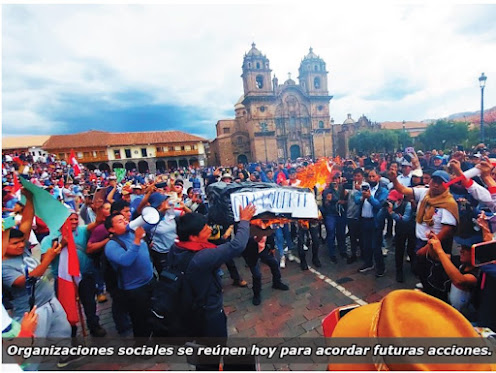Peru Has More Than 70 Active Protests Related to Mining (La República [Spanish] - 12/30/2022)
Peru Has More Than 70 Active Protests Related to Mining (Spanish)
According to the Ombudsman's Office, as of November 2022, there are 221 social conflicts in the country, of which 161 are active. In addition, around 47% of the agreements are not fulfilled.
Ricardo McCubbinIn December 2022, our country witnessed the uprising of citizens from various regions, who protested for political issues (they asked for early elections, the resignation of Dina Boluarte and the closure of Congress).
However, throughout this year, new disputes related to environmental issues have also arisen. According to the Ombudsman's Office, until the end of November, 221 social conflicts have been registered in Peru, of which 161 are active and 72 are related to mining.
It is important to note the case of Cusco, since it officially has twelve unresolved mining disputes, surpassing other regions such as Apurímac (9), Áncash (6), Ayacucho (6), Junín (5) and Pasco (5). Further down the list are Cajamarca (4), Moquegua (4), Huancavelica (3), Lima Provinces (3), Amazona (2) and Arequipa (2). Huánuco, La Libertad and Loreto have only one report each.
In this type of dispute, there is a variety of claims such as breach of agreements and delay in the execution of agreements. There are occasions, for example, in which the mining company reaches an agreement with the community to hire people from the area, so there is a discussion about what percentage of the workers should correspond to the locality.
“In other cases, economic compensation is required because land that is owned by the community is going to be used... There are also issues of environmental concern, especially in areas where there is agriculture nearby,” said Rolando Luque, deputy defender for the prevention of social conflicts and governance at the Ombudsman's Office.
Why is it difficult to resolve a mining social conflict?
Social conflicts about mining are the most complex to resolve, due to the high number of social actors involved, says Rolando Luque.
In this type of event, entities such as defense fronts, the organized population of urban areas, ministries, regional governments and districts or provincial municipalities may intervene.
Another reason that explains this difficulty, says Luque, is the large number of lawsuits that are raised. Likewise, forceful measures are usually taken quickly, such as blocking roads to interrupt, for example, the transit of vehicles that transport minerals in the mining corridor.
“They are also complex because they deal with economic issues in a context in which the majority of the population lives below the poverty line., their main needs are not being met and it is considered that the company should have a stake there, when in reality the State is obliged to provide basic services to the population”, he explained.
For Johnattan Rupire, sociologist and professor at the Universidad Nacional Mayor de San Marcos, Peruvian communities "have been and continue to be excluded from the country project in terms of the presence of the State " and that in this type of conflict the population finds itself "in the weaker end.
“The way in which this non-power (is) materializes in the few conditions that these communities have to develop a life in dignity", he claimed.
Why is Cusco the region with the most active mining social conflicts?
Rolando Luque clarified that Cusco is the region with the most active social conflicts linked to mining due to the number of mining operations in the region and because of the relations between social organizations and companies. They have not followed a stable course over time.
He also stated that it is important that all phases of the mining process are carried out carefully to guarantee the trust of the residents.
“This guarantee has to do with two main things: transparency in the information that the company gives to the communities and perception by part of the population of the benefits that having a company as an ally can bring them, in an area characterized by the poverty and inequalities," he said.
Around 47% of agreements are not fulfilled
According to the deputy counsel, approximately 47% of all agreements on social conflicts are not fulfilled because the minutes that are signed, after the rounds of dialogue, lack political momentum.
“In some cases, the dialogues are a bit rushed. The agreements are not well thought out and do not accurately reflect the interests of the parties. So, it is that (at) some time these points will have to be renegotiated again and discussed” he commented.
“What the Ombudsman has proposed is that this document should become part of the administrative processes of public management. Someone must be responsible for ensuring that these agreements enter the operating plans, have a budget and compliance deadlines, within the public function of each ministry, regional government or local government that has committed to execute them” he added.
The demands of the population are often legitimate.,
Both Johnattan Rupire and the representative of the Ombudsman agree that the demands of the communities can be legitimate. According to Rupire, the international context should be considered to analyze what the population requires.
For his part, Luque mentions that it is valid "to reread the current reality and see if new opportunities appear to improve the living conditions of the population."
“Doing mining in Peru means understanding local realities and establish appropriate relationships with the population in terms of respect. Indigenous peoples must be respected in their history, their culture, and their customs”, he pointed out.
Tags: #Protests #Cusco #Mining #Indigenous peoples




Comments
Post a Comment